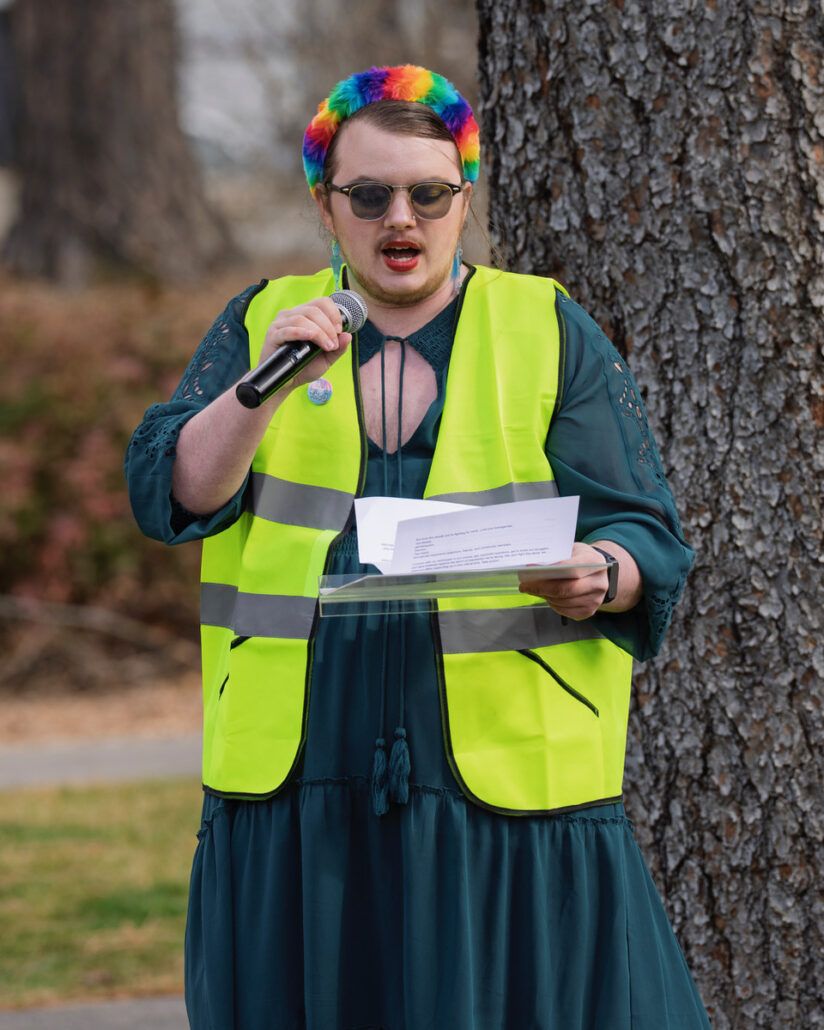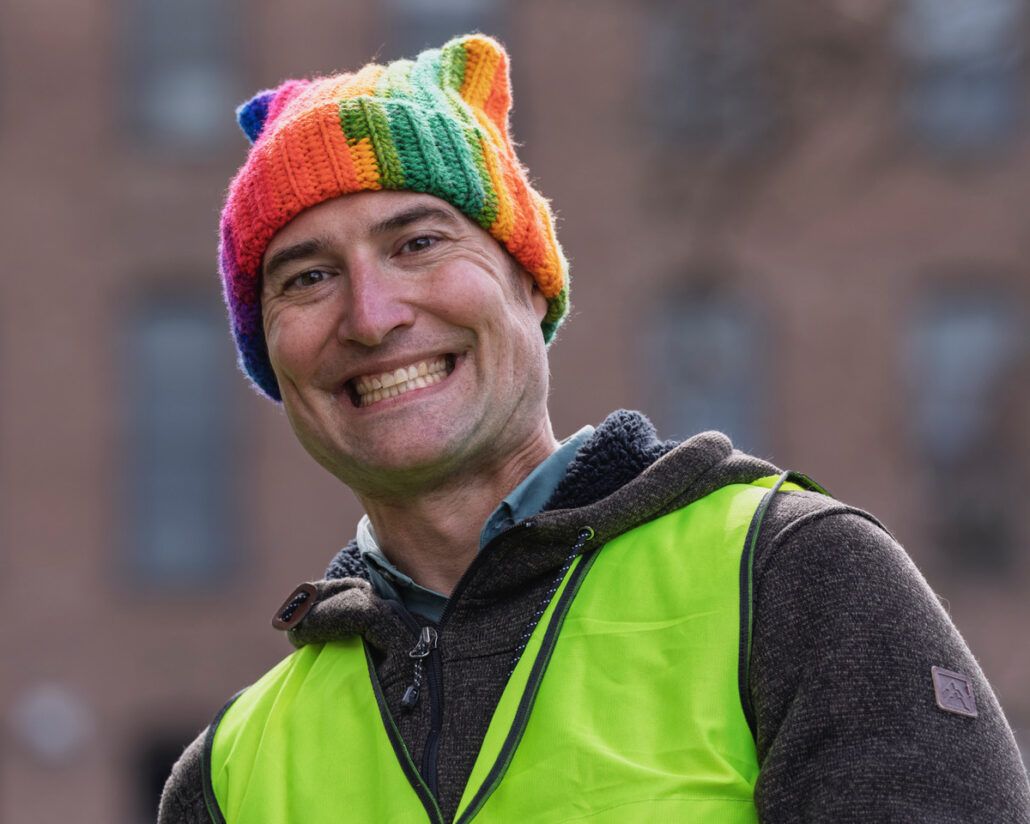Gender non-conforming individuals in Spokane feel burned by Christians
News Story By Emma Maple | FāVS News
Despite three decades of steady decline, the majority of Americans still report that they identify as Christian. However, for one demographic in particular, numbers show people steadily avoiding identification with this major religion — perhaps due to views promoted by Christians themselves.
Overall, the percentage of U.S. adults who identify as Christian has stabilized at around 60% over the last four years. However, very few people who are gender non-conforming (such as transgender and non-binary individuals) consider themselves Christian. Instead, around 60 %of individuals who identify as non-binary or “other” said they were either atheists, agnostic or nothing in particular.
“The non-gender conforming crowd is significantly less religious than those who say they are male or female,” Ryan Burge, an associate professor of political science, wrote on Substack.
One reason for this could be that many people in the gender non-conforming communities feel as if they are not accepted in Christian circles. Debby Williams, Seattle-based transgender activist, said she believes much of anti-trans rhetoric stems from Christians who think others must conform to their religious norms and beliefs.

Sometimes this can translate into direct action against the transgender community. Recently, Louis Stay, executive director of Trans Spokane, said someone came into one of their events and began screaming that transgender people were going to hell because God didn’t approve of them. Although security quickly removed the disruptor, Stay said, “it was one of those moments of like, another community that really strongly didn’t believe in what we believed, and didn’t want us there.”
Situations like these can make gender non-conforming individuals less likely to seek out religion, Stay said. His own experience evidenced that. Although he grew up in The Church of Jesus Christ of Latter-day Saints, he said he was treated negatively because he was queer and transgender. Ultimately, that led to him leaving religion behind.
“For me, I wasn’t all that interested, after having so many negative experiences with religion,” Stay said. “That’s the case for a lot of trans people who have been turned away from religion.”
Williams said she’s seen the same thing among people she works with. In one instance, there was a family who was attending a “dogmatically conservative” megachurch. When their child came out as transgender in their teenage years, Williams said the family started to see that the church harbored a lot of hateful views.
“I think that has turned that family away from religion,” Williams said, noting that sometimes these situations not only turn people away from religion, but also makes them “radically anti-religious.”
This often extends to the entire LGBTQ+ community, according to Matt Danielson, executive director of Spokane Pride. He said he grew up both gay and Christian, “and that left a lot of scars on me.”
While he said he now has some sort of spiritual side, he also doesn’t want anything to do with organized religion.
“The queer community as a whole has a really bad taste in its mouth, collectively, of the trauma that fundamentalism and religious dogma kinda left on us,” Danielson added.

This lack of acceptance can also translate to the political realm, where Christians often speak out in opposition to gender-affirming healthcare.
A recent poll by the Public Religion Research Institute found that Catholics and mainline Protestants tend to be evenly divided in whether they support bans on gender-affirming care for minors, while a majority of Jehovah’s Witnesses, white evangelical Protestants and Latter-day Saints say they support the bans.
Gender-affirming care can be especially difficult when the largest healthcare providers are religiously-based and may have their own bans on providing such care. And, even if they provide such care, Stay said gender non-conforming people often tend to avoid these healthcare institutions due to their overall discomfort in religious environments.
Christianity is not monolithic, however, and there are some Christians who not only are affirming, but also advocate for an interpretation of Christianity that offers support for gender non-conforming individuals.
Both Stay and Danielson said there is a strong group of Christians in Spokane who are explicitly affirming towards gender non-conforming individuals.
“At the same time,” Stay said, “I know there are plenty of religions that don’t agree with that.”
Williams, who has never been Christian, said instances of anti-trans actions and rhetoric seem dogmatically inconsistent to her.
“[It’s] people who talk about love and peace, and also [say] burn in hell,” she said. “I believe if there happened to be a God, that this God would want to protect all of his creatures. That includes trans people, and there’s no way around it.”
Although most avoid religion, statistics show that about 13% bof non-binary people identify as Protestant and 7% are Catholics. Stay said he’s seen gender non-conforming people in the Spokane community who also want to believe in and engage with Christianity.
However, even when gender non-conforming people want to engage with religion, finding those pockets of Christians who are affirmative can be challenging.
“I just really feel for trans people that are trying to seek religion,” Stay said. “It can be beneficial if you find one that is accepting, [but] it’s so hard to find one that is accepting.”
On Monday, the Spokane City Council will give vote on the proposed 2SLGBTQIA+ Protections Ordinance (C36667). If it passes, it will create a Shield Law in which the City will not provide any resources to assist in any investigation or detention of someone exercising their rights, one of them being gender-affiming care. Find out more on RANGE.








Thank you, Emma, for this reporting. It reminds us that conservative churches have been totally un-Christian in their treatment of the the gender non-conforming community. My liberal church (Evangelical Lutheran Church of America) strives to be welcoming and inclusive, but still could do much more to be truly so and embrace all God’s children.